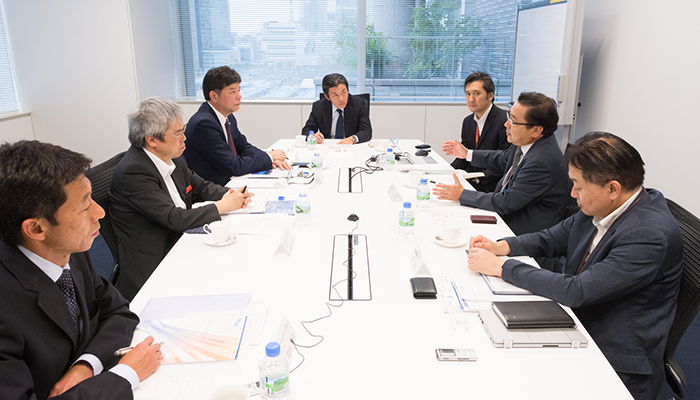
On September 21st, 2016 CSR Dialogue was held with two distinguished experts attending. The experts and Mr. Kenji Yokoyama, Senior Corporate Managing Director of NRI, discussed and exchanged opinions on topics such as 'sustainable society' that NRI Group wishes to achieve and 'NRI and SDGs (Sustainable Development Goals)'. Valuable opinions and insights acquired through the dialogue will be reflected in our business management and promotion of sustainability.
Participants
(Affiliation and position as of November 2016)
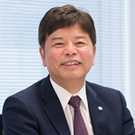
Tetsuo Kondo
Director, UNDP Representation Office in Tokyo
Adjunct Professor (Global Health Policy) at the University of Tokyo
In UNDP, he served as Country Director, UNDG Chad; Deputy Resident Representative UNDP Kosovo; Senior Advisor, UNDP Regional Center in Bangkok Headquarters of reconstruction assistance for Sumatra; and Humanitarian Coordination Advisor of UN delegation to East Timor. He assumed his current position in January 2014. Before joining UNDP, he served for the Ministry of Foreign Affairs up to 2005.
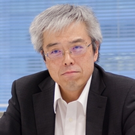
Eiichi Sadamatsu
Secretary General, Japan NGO Center for International Cooperation
Since March 2015, he has been in his current position, being instrumental in developing NGO sector and its collaboration with other sectors. In total thirty years of experience in serving for the Japanese Red Cross Society, Shaplaneer, Save the Children Japan. He also resided in Nepal for eleven years.
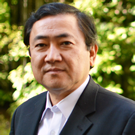
Kenji Yokoyama
Senior Corporate Managing Director, NRI
Leading initiatives for promoting sustainability and solution for social issues through NRI business, based on middle- and long-term perspective. He is in charge of global operation planning, corporate communication, administration, operations & control, procurement, accounting and finance.
Facilitator: Hiroshi Ishida
Executive Director, Caux Round Table Japan
Yokoyama (NRI)
Under the leadership of new president Mr. Shingo Konomoto, inaugurated in April 2016, NRI has been promoting the long-term management vision "Vision 2022" started from 2015. Along with execution of the management vision, we expect NRI will encounter with further opportunities for growing overseas business in future. Envisioning that NRI should be able to respond to social issues and multi stakeholders' needs based on a global perspective more than ever, we decided the theme of this dialogue "Role and responsibility of NRI for creating sustainable society towards the future".
What kind of society does NRI envision in 2022 and 2030?
Kondo (UNDP):
First of all, I would like to ask what kind of society does NRI envisage in 2022 by defining Vision 2022, the long-term management vision? Also, NRI set a theme of the student essay contest 'towards 2030', so I wonder if the theme implies the target year of United Nations Sustainable Development Goals? And how does NRI position the two target years 2022 and 2030?
Yokoyama (NRI):
2030 is an important year for us, recognizing that it is a definite point in the future when sea changes will be taking place in society. Since NRI management vision is based on a cycle of eight years, we define 2022 as a target year for completing the current growth strategy following the previous management vision, Vision2015. In Vision2022, non-financial strategies in CSR, Environment, and 'Health and Productivity Management' are addressed to a large degree, for example, regarding CO2 reduction, NRI is planning to achieve 25% of CO2 reduction in 2022, which is 8 years before the target goal set by Japanese government in 2030.
Kondo (UNDP):
Secondly, in TICAD VI (the 6th Tokyo International Conference on African Development) held last month in Nairobi, Prime Minister Mr. Abe emphasized some unique Japanese values, such as 'kaizen', 'disaster prevention' and 'mottainai', particularly those values demonstrated by business/industries. Some Japanese business leaders also made comments about good practices reflecting such values. Does NRI have any thought or plan to grow its future market and customers through development and reconstruction support in conflict areas and developing countries?
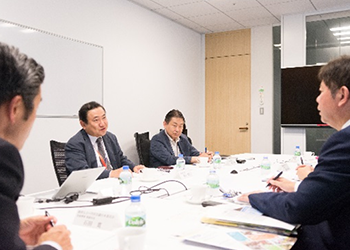
Yokoyama (NRI):
NRI Consulting business has offered various kinds of support to our clients for their business overseas, infrastructure development and technology exports. Especially under the current Abe administration, we have been focusing on assisting planning and operation of nation building processes, in countries including those of Africa. Also our IT Solution business has already started offering financial solutions in Mongolia and Bangladeshi, and taking a role of supporting development of those emerging countries by building capital market infrastructure and developing human resources in a country with high market growth potential.
Regarding 'kaizen', 'disaster prevention' and 'mottainai', our role is to propose soft contents or ideas, since we are not manufacturers. For example, regarding the Kumamoto earthquake, two NRI staffs have been stationing in Mashiki-machi, in order to offer consultation for reconstruction. Likewise, after the Great East Japan Earthquake, similar supportive activities are taking place in many places. These are what only NRI could offer because of its diverse knowledge and experience: all of them are based on the philosophy 'Dream up the Future' that drives our behavior.
Kondo (UNDP):
Efforts made by the Japanese government in terms of
offering
technology
and financial assistance for poverty reduction had a fundamental impact, as a background to a
transformation
in
goals from MDGs (Millennium Development Goals) in 2000 to SDGs (Sustainable Development Goals) in
2015. In
Africa,
expectations for Japanese technology infrastructure development are so high that some Japanese
companies are
planning to take the initiative for achieving SDGs in collaboration with UNDP.
IT Technology is one of the keys to succeeding in SDGs. SDGs are goals, but not methods. Therefore
in order
to
attain SDGs, NRI would like to make the most of our methodology/ideas and IT solutions know-how. It
is a
long way to
go; however we believe that there are significant business potentials to fill in that distance.
What is 'Sustainable Society' according to NRI's definition?
Sadamatsu (JANIC):
Today's theme is 'creating a sustainable society for the
future'.
So
precisely, what is the definition of sustainable society for NRI? Furthermore, what are the
differences
between a
sustainable society and a conventional society, and how are they different? Presumably NRI is one of
the
Japanese
companies that have driven 'previous' development models before the concept of 'sustainable society'
arose.
For this
reason, it would be quite challenging for NRI to take a strong initiative for leading towards a new
sustainable
society, unless NRI itself can change drastically. It would be necessary for NRI to consider how to
define
the
society that they are aiming at, and how that society is different from a conventional society.
To be honest, we do not have a clear definition: the concept of a future sustainable society is
broad
including not
only environmental issues, but also the 4th industrial revolution by artificial intelligence,
transformation
of
society brought by IoT (internet of things), fatigue of regional financial institutions, and issues
of
regional
revitalization. What NRI can do with such diverse issues is to take initiatives in navigating and
innovating
for the
future. For example, Green Bond issued last week is a scheme created with a wish that increasing
number of
companies
that issue Green Bonds and grow the market worth some trillions yen like the one in Europe, and such
money
to be
used for resolving environmental or sustainability issues.
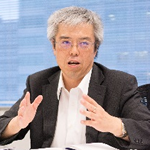
Sadamatsu (JANIC):
SDGs (Sustainable Development Goals) and previous MDGs
(Millennium
Development Goals) are fundamentally different, in terms of way of development aimed at a paradigm
shift
happened in
society. In the MGDs scenario, we had a mindset that those developing countries are becoming
developed
countries
someday, whereas in SDGs scenario, we are sharing a common concern 'if we all aim at becoming
developed
countries,
the planet would not sustain.'
There is another factor: evoking aspiration of'creating a society where no one to be left behind',
due to
extremely
uneven distribution of wealth. In many parts of the world, recurrent conflicts are violating human
rights in
societies. I believe that aiming at a sustainable society means creating a society which is in
peace, faire
and
respectful for human rights.
What Themes among 17 Goals in SDGs should be Material for NRI?
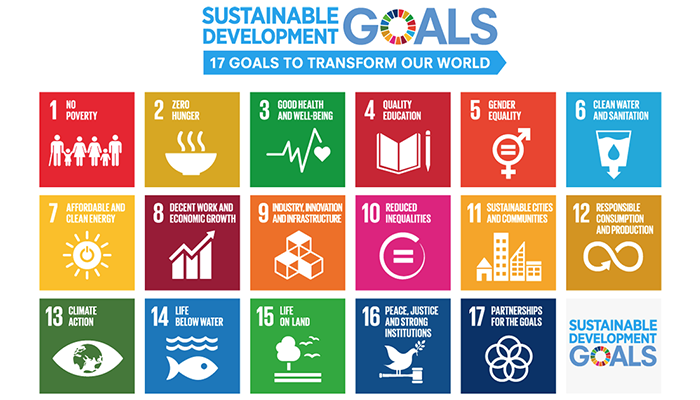
Sustainable Development Goals (SDGs) Logo
Kondo (UNDP):
I think the 9th goal'Industry Innovation and Infrastructure' is material, because IT access and connectivity evoke people spontaneously many ideas to improve their lives. I found that is true in many cases I experience in UNDP. Therefore we can say that establishing industrial infrastructure is an exclusive prerogative of NRI.
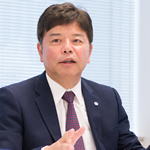
Another one should be the 10th goal 'Reduced Inequalities'. There is disconnection between the wealthy and the poor, and expectations of those poor who had believed and supported those wealthy leaders were betrayed. Brexit (UK's breakaway from EU) and the Trump phenomenon are representations of discontent of these societies. For us this is a lesson, namely, erosion of trust by disparity divide people and drives them toward a wrong direction. And in such context, NRI is the one who can empirically make a proposal on how those wealthy can fundamentally change the world.
Sadamatsu (JANIC):
Agree. I also expect companies like NRI to find a
breakthrough for
the
10th goal 'Reduced Inequalities'. Related to the 10th goal, the 17th goal addresses 'Partnerships
for the
Goals.'
Creation of new funding schemes is one of the challenges for achieving SDGs. So far, official
development
assistance
has been a main driver, however recently governments are facing short of capital and decreasing tax
revenue.
I heard
that the origin of NRI is Nomura Securities, and stock exchange is a global business. For me,
therefore, it
would be
a significantly appealing if NRI, as an institution originated from a securities firm, takes
initiative in
creating
new schemes for resolving global issues by utilizing profits earned from global transactions.
In addition, in order to propose a new lifestyle and new values that lead NRI toward 'Dream up the
future',
it is
critical to address the 12nd goal 'Sustainable Consumption and Production'. For example, the goal
indicates
to halve
current level of food waste by 2030, though that would be a tremendous challenge for Japan.
Nevertheless it
would be
conceivable that a new food management scheme/solution for reducing food wastes can be created and
installed
in the
existing CVS systems that NRI provided. For it is known that convenience store (CVS) is one of the
most food
wasting
sectors today.
Involvement in multiple activities would make NRI difficult to define specific areas to give
exclusive
focus, and it
is understandable. Yet still NRI should clearly define vector for the future, no matter what areas
to be
focused.
Kondo (UNDP):
Related to the previous topic, for example, if investors acknowledge the companies' efforts for reducing food waste and accordingly make their investment decision, that would result in enhancing societal value of NRI.
Yokoyama (NRI):
In fact this is for the first time for us to issue Green Bond, and I found when I heard from investors and companies about their perception or judgment many of them were talking about such ideas and intentions. I felt change and vivid response: this is like a huge swell.
Sadamatsu (JANIC):
As a concrete proposal, NRI can address 'contribution for resolving the global agendas' as one of its goals in the long term visions in V2022.
Ishida (CRT):
Today we have discussed many positive aspects, but NGOs are also critically watching negative impacts. I heard that NRI has about 4000 Chinese offshore partners and labor situation there is in fact one of my concerns. Since NRI belongs to information service industry, probability of having child labor issue would not be so high. But it is critical to have an attitude to listen to voice of employees and local communities. That is an attitude of carefully listening to each individual right holders rather than stakeholders.
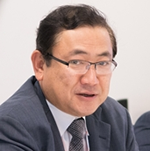
Yokoyama (NRI):
We truly appreciate this great opportunity today: we would like to leverage those insights learnt from you in NRI sustainability activities in the future, especially for preparation of launching ‘Sustainability & Responsibility Group’ next month, in October 1st. Regarding the recommendation 'defining of sustainable society', we would sincerely take your message, and carefully consider and address along with clear vision and policy that stand for NRI way.
Thank you very much.
(Published in 13, Jan 2017)